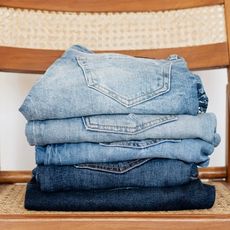Why Washing Your Clothes with Cold Water is Better for the Planet

June 23, 2024
Looking for ways to be more conscious of the planet? Embrace a more sustainable laundry routine with one simple swap: cold water washing. Compared to hot or even warm water, washing your clothes with cold water is an easy switch with immense environmental benefits that also happens to benefit your clothes (and your wallet). Here’s why:
Environmental Impact
While traditional hot water loads use a significant amount of energy, switching to cold water (even warm water, at that!) reduces energy usage, thus lessening greenhouse gas emissions and environmental footprint.
Cold water washing also reduces the amount of microfiber pollution in our waterways. When we use hot water to wash our clothes (especially clothes made of synthetic fabrics), microfibers shed more easily, making their way into our water supply. Cold water washes, on the other hand, are gentler on fabric fibers, resulting in fewer microfibers released each laundry cycle.
Cost Efficiency
It may go without saying, but washing your clothes with cold water can significantly cut down on energy bills. With the rising cost of energy, we love finding easy ways to save—and without the need to heat up water, there’s the potential to see tangible household expenses start to drop.
Cold water cycles are also typically gentler on clothes—preventing excessive agitation and heat exposure that can fade dye and break down fibers over time. Cold water helps reduce this wear and tear, preserving your clothes’ shape, color, and overall quality, i.e. keeping them wearable for longer. Less damage in the laundry cycle, less spent on a new wardrobe.
How To: The Perfect Cold Water Cycle
When it comes to washing your clothes in cold water, following a few best practices can ensure optimal results (in this case, clean clothes that look as good as they feel).
- Make sure your washing machine is set to the appropriate cycle for cold water washing. Some machines have specific settings for cold water, while others have a "tap cold" option.
- Choose a laundry detergent specifically designed for cold water use. These detergents typically contain natural enzymes that effectively clean clothes even in cold water temperatures.
- Avoid overloading the washing machine to allow clothes to agitate and rinse properly.
The Right Detergent for You
It's essential to choose a detergent specifically formulated for cold water use, like Blueland Laundry Detergent Tablets. These detergents use enzymes that thrive in lower temperatures—like amylase and mannanase—to gently but powerfully target different types of stains, from food and oil to protein-based stains.
Should You Pre-Treat Stains?
The short answer? Yes. Pre-treating stains before washing them in cold water can help improve the effectiveness of a gentler cleaning process. Here are some steps to follow for pre-treating stains:
- Identify the type of stain: Different stains require different treatment methods. Determine whether the stain is oil-based, protein-based, or a combination of both.
- Blot or scrape off excess residue: Use a clean cloth or paper towel to gently remove any excess stain-causing residue. Be careful not to spread the stain further.
- If oil-based: Apply a bit of liquid dish soap and water to the stain and gently rub the oil-based residue. You should see the stain start to dissipate.
- If not oil-based: Use a stain remover specifically designed for the type of stain you're dealing with—we love Blueland Oxi Laundry Booster.
- Let the stain remover sit: Allow the stain remover proper time to work its magic.
- Wash as usual: After pre-treating the stain, wash the garment as you normally would in cold water. Check the stain after washing to ensure it has been fully removed. If necessary, repeat the pre-treatment process.
Frequently Asked Questions
Can All Clothes Be Washed in Cold Water?
Essentially, yes! Delicate fabrics, like silk and lace, that often require special care are always best washed in cold water to prevent damage—but even sturdier fabrics like cotton and wool benefit from the gentleness of a cold water cycle.
How Does Cold Water Washing Save Energy?
Cold water washing eliminates the need for water heating, which accounts for a significant portion of energy consumption in laundry. By washing clothes in cold water, you can reduce energy usage by up to 90%, not only lowering your energy bills but also reducing the environmental impact associated with energy production.
Does Cold Water Shrink Clothes?
No, shrinkage occurs when fabric fibers contract due to high temperatures. Cold water typically allows clothes to easily maintain their original size and shape. However, it's always important to read the care instructions on clothing labels to ensure proper washing.
Featured Products
Keep Reading
Refill is the New Recycle
The perfect way to start cutting out single use plastic from your home.
















